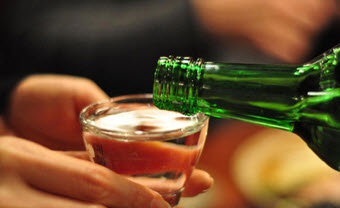
The research matters to Koreans that Korean drink also works on stroke as wine does.
Soju, the national liquor of Korea, is a distilled, vodka-like, rice liquor with high alcohol level, also known as the Korean equivalent of Japanese Sake. Its ready availability and low price makes it not only the most popular alcoholic beverage in the nation, but also the best-selling liquor worldwide. Furthermore, Soju is modest in flavor, making it easy to drink in combination with various Korean dishes. The mild and smooth taste also catches drinkers off-guard as it goes down very easily, yet its 20% alcohol content makes it easy to get drunk in a short time. Thus, like most liquors with high alcohol level, Soju is often frowned upon for its negative social and health effects.
However, a team of neurologists at Seoul National University hospital in Bundang recently revealed that a few shots of Soju a day can significantly lower the risk of strokes in both men and women. The research paper was published in the current issue of “Neurology”, the official academic journal of the Society for Neuroscience. According to their study, consuming one shot a day reduced stroke possibilities by 62% in males. Having two shots reduced such risks by 55%, and three to four shots, by 46%. For women however, the anti-stroke effects of Soju were most effective when one to two shots were consumed per day.
The research team led by Professor BAE, Hee Jun, conducted the study on 1,848 patients, aged 20 and above, who were registered in the 2011-2013 Clinical Research Center for Stroke database from the Ministry of Health and Welfare, along with 3,589 participants of the National Health and Nutrition Survey as the comparison group. The purpose of the study was to find a correlation between alcohol consumption, particularly Soju, and risk of strokes. Although there had previously been investigations on the same topic, which found similar positive results, these studies were only based on Westerners who mostly consume wine or beer. Thus, Professor Bae claims the significance of this recent research is that it is the first to examine the effect of locally brewed spirits on South Koreans.
However, Professor Bae emphasized that the study was only focused on preventive effects of Soju on strokes, limiting the intake to four shots a day. He warned that excessive drinking will indeed increase risks of strokes and other illnesses.
References: http://www.yonhapnews.co.kr/bulletin/2015/11/05/0200000000AKR20151105172600017.HTML
Written by Hye Bin Lee, SNU English Editor, hahahybes@snu.ac.kr
Reviewed by Eli Park Sorensen, SNU Professor of Liberal Studies, eps7257@snu.ac.kr

